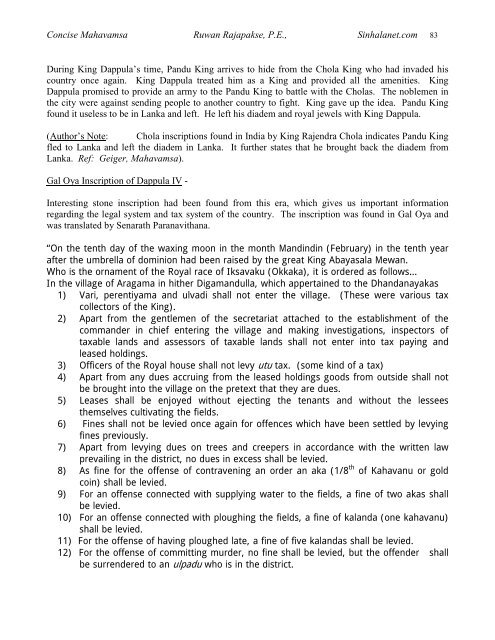Concise Mahavamsa Ruwan Rajapakse, P.E., Sinhalanet.com 1
Concise Mahavamsa Ruwan Rajapakse, P.E., Sinhalanet.com 1
Concise Mahavamsa Ruwan Rajapakse, P.E., Sinhalanet.com 1
You also want an ePaper? Increase the reach of your titles
YUMPU automatically turns print PDFs into web optimized ePapers that Google loves.
<strong>Concise</strong> <strong>Mahavamsa</strong> <strong>Ruwan</strong> <strong>Rajapakse</strong>, P.E., <strong>Sinhalanet</strong>.<strong>com</strong> 83<br />
During King Dappula’s time, Pandu King arrives to hide from the Chola King who had invaded his<br />
country once again. King Dappula treated him as a King and provided all the amenities. King<br />
Dappula promised to provide an army to the Pandu King to battle with the Cholas. The noblemen in<br />
the city were against sending people to another country to fight. King gave up the idea. Pandu King<br />
found it useless to be in Lanka and left. He left his diadem and royal jewels with King Dappula.<br />
(Author’s Note: Chola inscriptions found in India by King Rajendra Chola indicates Pandu King<br />
fled to Lanka and left the diadem in Lanka. It further states that he brought back the diadem from<br />
Lanka. Ref: Geiger, <strong>Mahavamsa</strong>).<br />
Gal Oya Inscription of Dappula IV -<br />
Interesting stone inscription had been found from this era, which gives us important information<br />
regarding the legal system and tax system of the country. The inscription was found in Gal Oya and<br />
was translated by Senarath Paranavithana.<br />
“On the tenth day of the waxing moon in the month Mandindin (February) in the tenth year<br />
after the umbrella of dominion had been raised by the great King Abayasala Mewan.<br />
Who is the ornament of the Royal race of Iksavaku (Okkaka), it is ordered as follows…<br />
In the village of Aragama in hither Digamandulla, which appertained to the Dhandanayakas<br />
1) Vari, perentiyama and ulvadi shall not enter the village. (These were various tax<br />
collectors of the King).<br />
2) Apart from the gentlemen of the secretariat attached to the establishment of the<br />
<strong>com</strong>mander in chief entering the village and making investigations, inspectors of<br />
taxable lands and assessors of taxable lands shall not enter into tax paying and<br />
leased holdings.<br />
3) Officers of the Royal house shall not levy utu tax. (some kind of a tax)<br />
4) Apart from any dues accruing from the leased holdings goods from outside shall not<br />
be brought into the village on the pretext that they are dues.<br />
5) Leases shall be enjoyed without ejecting the tenants and without the lessees<br />
themselves cultivating the fields.<br />
6) Fines shall not be levied once again for offences which have been settled by levying<br />
fines previously.<br />
7) Apart from levying dues on trees and creepers in accordance with the written law<br />
prevailing in the district, no dues in excess shall be levied.<br />
8) As fine for the offense of contravening an order an aka (1/8 th of Kahavanu or gold<br />
coin) shall be levied.<br />
9) For an offense connected with supplying water to the fields, a fine of two akas shall<br />
be levied.<br />
10) For an offense connected with ploughing the fields, a fine of kalanda (one kahavanu)<br />
shall be levied.<br />
11) For the offense of having ploughed late, a fine of five kalandas shall be levied.<br />
12) For the offense of <strong>com</strong>mitting murder, no fine shall be levied, but the offender shall<br />
be surrendered to an ulpadu who is in the district.


